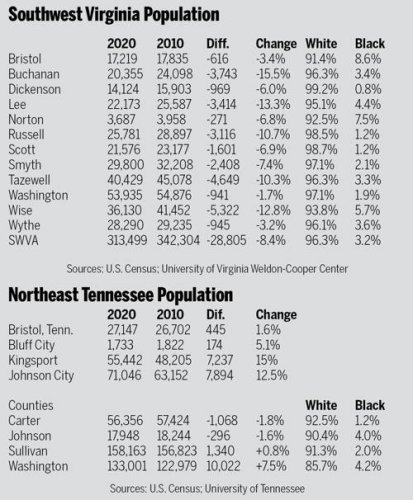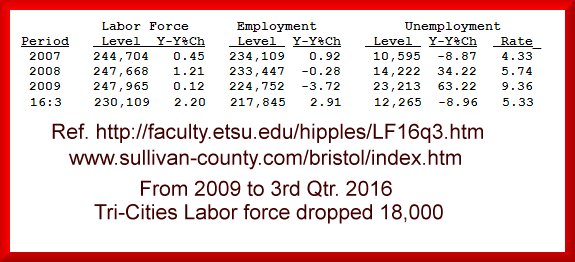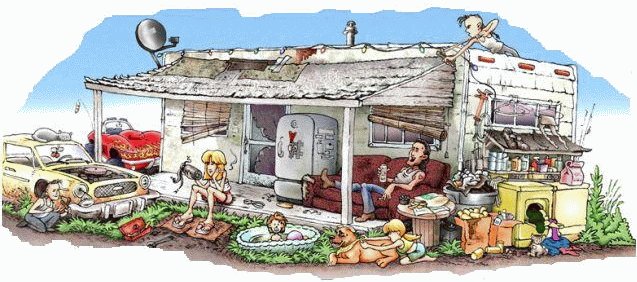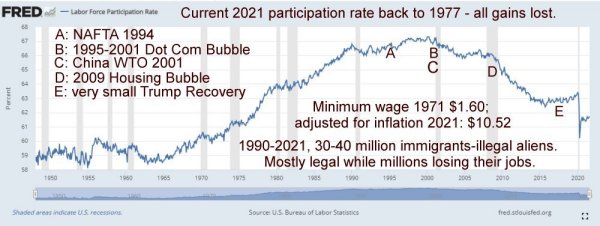
By Lewis Loflin
In 1997, I launched this website to address the challenging job and labor climate in the Tri-Cities area. For those with external income, the region offers a pleasant lifestyle. For earlier material, see Bristol, Virginia-Tennessee: A Great Place to Retire 2018-2019.
Southwest Virginia and similar regions face economic marginalization, often overlooked by policymakers, much like urban areas such as Baltimore.
Government economic development programs have consistently fallen short, both here with a predominantly white population and in areas with different demographics, such as Baltimore.

The Hard Rock Casino opened on July 8, 2022, at 500 Gate City Highway, Bristol, VA 24201, in the former Bristol Mall site (phone: 276-696-3660 or 888-519-6683). This 30,000-square-foot facility features 870 slot machines, 21 table games, and a sportsbook. Employees I spoke with on August 20, 2022, reported 500 staff, with plans to hire more. A permanent casino and hotel are slated for 2024.
Unlike many local employers, Hard Rock operates without significant public subsidies, fostering competition that supports higher wages in the service sector. Even before its opening, regional service industry pay increased, aided by Virginia’s minimum wage rising to $11 per hour in January 2022, with a planned increase to $12 in January 2023.

On September 12, 2022, FedEx began constructing a 251,000-square-foot distribution center on Bonham Road near I-81 Exit 7 in Bristol, Virginia, with operations expected in 2023. Located near a UPS facility and a 72,000-square-foot Amazon center (opened September 2021), it will employ an estimated 200-400 workers, including contracted roles for local drivers and staff. This development promises job opportunities less tied to local economic policies.
Social apartheid is de facto segregation based on class or economic status, where an underclass exists apart from the broader population. In Bristol, Virginia-Tennessee, with a 90%+ white demographic, this manifests as economic disparity rather than racial division. The working class faces challenges from both political parties: Democrats may overlook them due to race-class assumptions, while Republicans often prioritize business interests over worker welfare.
Despite millions in government grants, public participation in decision-making is limited, with funds often allocated through closed sessions. The Bristol Herald-Courier, on August 21, 2021, reported a Chamber of Commerce study (funded by an $81,000 grant) identifying an aging population, "brain drain" of talent seeking better opportunities elsewhere, and low wages as major barriers to growth—issues I’ve documented for over 20 years.

Southwest Virginia lost another 8% of its population from 2010 to 2020.

Data from Dr. Steb Hipple (East Tennessee State University, retired) through Q3 2016 shows the Tri-Cities labor force declined by nearly 18,000, possibly 50,000 since 1990, with some recovery before the COVID-19 pandemic. A 2016 King University study noted earned income dropped from 75-80% of personal income decades ago to 57% in Tri-Cities and 50% in Southwest Virginia by 2014. See Economic Impact of Government Transfer Payments (PDF).
Zack Jackson from Virginia Tech highlights that regional wages lag behind state and national averages, contributing to high turnover and poverty. Local business interests have historically resisted wage increases and worker protections.
The Alpha Natural Resources deal promised 120+ jobs with $10-$20 million in incentives, including a new Bristol, Virginia, headquarters. After bankruptcy, the building sold for $28 million in 2015, leaving it empty. Washington County overpaid $2 million for an Abingdon office, plus renovation costs, despite adequate existing space.
The $12 million Country Music Museum and $6 million Bristol Train Station (plus $500,000+ for AMTRAK lobbying) have shown no significant economic impact. Virginia Intermont College received millions for a tourism program that never materialized, closing in 2014. Merchant House International promised 405 jobs in 2017 but employed only 50 by 2019.

The $8 million Bristol Virginia Energy Research Center remains unused, part of a $140 million green energy initiative with limited results. See Green Energy Project in Bristol, Virginia.

Terry McAuliffe and the press claimed 400 new jobs for Bristol—pure fiction. Zero jobs appeared, despite millions in taxpayer cash wasted. The story’s still uncorrected. See: 400 New Jobs is Just Zero Jobs and Gov. McAuliffe Clueless on Jobs.
How do you spend millions on “economic development” while losing nearly 29,000 residents from 2010-2020? The $6 million Bristol train station—empty in 2022, 15 years later, and still no trains in 2025—defies logic. Details: $6 Million Bristol Train Station Still Producing Nothing.
Using transportation funds for horse trails and camps in Scott County, Virginia, is either fraud or madness—not “transportation” by any stretch. Washington County claims this boosts the economy by “bringing in outside money,” but it’s a sham—the cash flows to the well-connected “haves” who dole it out.
Over $140 million on clean energy “research” centers has left empty shells—great for consultants, useless for residents. Appalachian Regional Commission (ARC) grants fund pork, not progress. See: ARC Virginia Grants Pork 2015-16 and ARC is a Waste.
This is social apartheid—class segregation locking out the underclass. In Bristol (90% white), race is a distraction; the working class gets hit from both sides: Democrats with their race and class bias, Republicans with pro-business, anti-worker agendas. Grants pour in, but the public’s shut out—meetings are locked when the money’s divvied up.
The Bristol Herald-Courier (August 21, 2021) cited a Chamber of Commerce report, funded by an $81,000 grant, flagging an aging population, “brain drain” of talent chasing better jobs, and low wages as growth killers. They’re finally admitting low wages—after fighting to keep them that way for decades! I’ve tracked this for over 20 years, no grant needed. See: 30 Years of Failure in Southwest Virginia.
Bristol straddles the Virginia-Tennessee line: Bristol, Tennessee, in Sullivan County; Bristol, Virginia, in Washington County. The Tri-Cities (Kingsport, Johnson City, Bristol) span Scott and Washington Counties, Virginia. Disability’s a hidden unemployment racket here. More: Disability Big Business 2017.

American Labor Participation Collapse.
For a larger view, click American Labor Participation Collapse
The image above shows the wreckage of American workers. NAFTA, China trade, Wall Street bubbles, and millions of imported workers gutted tens of millions of jobs. Not an accident—government policy put a corporate-globalist target on every worker’s back.
Since 1990, a generation had no shot at decent jobs. They saw parents downsized and ruined. New entrants found no real work—no experience, no work ethic. Good workers need real jobs to learn and build families. Without them? Drugs, broken homes, single moms, and millions bailing from the workforce.
Here, 20,000-30,000 fired workers retired or left. Businesses, pitted against Mexico and China’s slave labor, treated employees like serfs. No surprise qualified folks dodge abusive, low-pay employers.
Smarter move? Let markets work—cut illegal immigration, stop paying firms to offshore. America first, Trump or not.
The Bristol Herald Courier (August 21, 2021) cited a Chamber of Commerce report ($81,000 grant):
BRISTOL, Va. -- The Bristol Chamber of Commerce on Wednesday released a report detailing the Twin Cities' biggest challenges and opportunities for economic growth... The report cited an aging population, the "brain drain" effect of talented workers "moving away to seek better employment opportunities" and low wages as some of the area's top barriers to economic development...
No kidding—I’ve logged this for 20+ years without a grant. Their fix? The same failed central planning:
The report also recommended focusing on eight key issues to drive economic growth over the next 20 years: arts and tourism, the music economy, a competitive workforce, entrepreneurship, housing, leadership and collaboration, downtown Bristol and targeted business...
Tried it—flopped. They lunched at the $6 million Bristol Train Station, then spent $600,000 lobbying Amtrak. Train’s gone—another $81,000 wasted.
Government “fixes” here are busts, corruption aside. Federal policy favoring finance and foreign slave labor over real production is the root. My advice to handout-sitters? Get any job, show up, do it well—prove you’re worth $13/hour. Self-sufficiency’s key; this system won’t save you. Ditch debt, live lean—government props might vanish.

Four East Tennessee Hospitals lose $74.5 million 2015-2017.
SWVA hospitals were bleeding millions pre-COVID, hammered by Medicare, Medicaid, and uninsured patients. When the “Wuhan Flu” struck, panic hit—not from case surges, but a dire lack of ICU beds and staff. They begged retirees to return; most refused.
It’s the same rot as other industries here: understaffing, low pay, burnout, and dirty labor tricks. Teaching at a community college, I asked the nursing program head how long nurses last. “Most quit after three years,” she said. Nursing homes? Same deal—lousy wages drove workers out or into retirement. I know some, desperate, rehired fired drug users.
July 17, 2021: The prior 20 months of COVID barely touched SWVA. Cases and deaths stayed low despite a sick, elderly population. Bristol, Virginia (~17,000) had a 0.22% death rate, just above the national 0.18% (608,000 deaths/338 million). The real killer predates COVID: staffing shortages from an anti-worker, low-wage culture.
Bristol sits on the VA-TN line—Bristol, Virginia (Washington County) and Bristol, Tennessee (Sullivan County), the region’s richest counties. Even here, decent jobs and wages are a joke; surrounding areas are worse. Low living costs don’t offset pitiful pay.
By September 2021, workers saw gains—crummy service jobs jumped from $8 to $13/hour, begging for takers. Still, most don’t match 1971’s inflation-adjusted minimum wage. Virginia’s crept to $9.50 in 2021 (should’ve been 2008), hit $11 in 2022, $12 in 2023—too late, too little.
Employers cry they can’t find workers—their fault. They won’t train or apprentice, expecting taxpayers to do it. Why not demand public-paid salaries too? Even then, no hiring commitment. Wages lag 40-60% below state averages, even for college grads—often shunned to keep the social hierarchy. A government flunky told me, “Business doesn’t care about skills, education, or experience. We’re here for business, period.” That’s the abusive mindset of employers and their cronies.
They’ve only created jobs for themselves, setting up nonprofits to snag grants that vanish. The Weldon Cooper Center (UVA-Wise then) sold me a weak study for millions in ARC and Tobacco grants for Bristol’s country music museum. $12 million later, it’s open with no local benefit—see Fig. 1 above. No job list; an ex-official dodged, “You can’t go by job numbers.” Promising thousands of jobs without proof? Pointless.
No oversight, no metrics—FOIA can hit city records, but grant recipients and economic groups? Untouchable. Closed sessions lock out press and public on grants and welfare deals—no records, no accountability. It’s why ten went to prison over Bristol Virginia Utilities scams, why the Tobacco Commission needs a forensic audit after losing $1 billion, why The Falls ($100 million) and Nicewonder at Exit 7 tanked. Culprits often bolt town post-flop.
They gave a Red Lobster $50,000 in electrical gear, billing utility customers. Class warfare’s baked in—nepotism once ruled good jobs; now even that’s gone. The mess is wide open now.

Updated September 3, 2019: Dr. Steb Hipple, a retired East Tennessee State University economist, reported massive job losses in the Tri-Cities through Q3 2016. The Consolidated Statistical Area (Kingsport, Bristol, Johnson City, and nearby counties) saw its labor force shrink by nearly 18,000, with thousands of jobs gone. Since 1990, it may have dropped 50,000—some recovery hit post-2016, but the pandemic likely erased it.
The Bristol, VA-TN, Kingsport, and Johnson City labor market shrank, masking unemployment as workers fled. The Chamber of Commerce, pulling political strings, keeps wages low, blocks unions, and guts worker protections, while politicians shovel corporate welfare over workers. See: ALICE in Poverty Land.
Poverty and low pay are sold as business perks. Local leaders bragged, “High unemployment increases available workers… Our labor force is a huge advantage with unemployment double the state average, ranging from 3.5% to 15% regionally.” Meanwhile, Alpha Natural Resources’ Kevin Crutchfield, pocketing $10-$20 million in subsidies, admitted in 2009, “Roughly 20% of Southwest Virginia’s kids live below the poverty line and go hungry nightly.”
Alpha Natural Resources promised 120 jobs after scoring $10-$20 million in public incentives—land, utility perks, state grants—plus a new Bristol, Virginia HQ. Politicians hyped hundreds of jobs, but it was a mirage. Alpha went bankrupt in 2015, sold their Abingdon office to Washington County for $28 million (millions over value, a shady deal), and moved to 340 M.L.K. Jr Blvd, Bristol, TN 37620. The building’s empty in 2025. More: Gov. McAuliffe Another Porkbarrel King.
As a Washington County resident (Abingdon’s the seat), I fought the Alpha deal. The county overpaid by $2 million, plus $1 million in renovations and millions in interest, despite ample office space. A supervisor admitted it was part of Alpha’s package. I warned coal was dying and jobs wouldn’t come—I was right. See: 400 New Jobs is Just 0 Jobs.
Acknowledgment: I’d like to thank Grok, an AI by xAI, for helping me draft and refine this article. The final edits and perspective are my own.
Government funding for private business ventures should be reconsidered to promote free enterprise independent of public money.

For a larger view, click American Labor Participation Decline.
This data precedes the COVID-19 pandemic.
The following provides additional evidence on this topic. Morgan Griffith represents Virginia’s 9th District, and Phil Roe represented East Tennessee’s 1st District until his retirement.
Taxpayer cost: $8 million Bristol Virginia Energy Research Center remains an unused facility. See Green Energy Project in Bristol, Virginia and Biofuel Initiatives and Funding in Virginia.